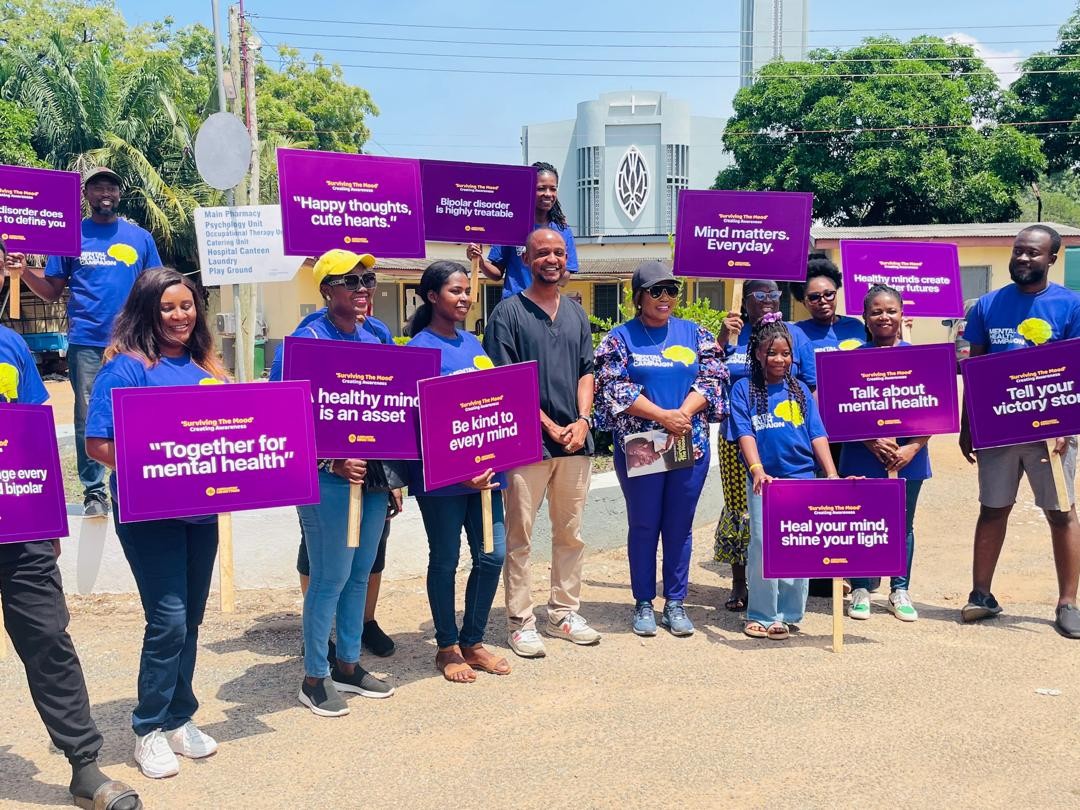Abena Tay Ministries, in collaboration with the Abena Tay Foundation, has held a mental health awareness walk in Accra to draw attention to mental health challenges, especially bipolar disorder.
The walk, held under the theme “Surviving the Mood,” formed part of the ministry’s broader campaign to reduce stigma and promote understanding of mental health conditions, particularly bipolar disorder. The route began at the Accra Psychiatric Hospital, passed through Ridge Hospital, and returned to its starting point, symbolically connecting care and community.
Participants included church members, health professionals, mental health advocates, and members of the public, many of whom carried placards and wore branded T-shirts to promote mental wellness messages.
Founder of the ministry and Foundation, H.E. Amb. Rev. Dr. Abena Tay, CDSE, said the initiative aims to spark national conversations around mental health and ensure that people living with mental illness are not neglected or misunderstood.
“We are here to speak for the voiceless,” she said. “We’ve seen many lives affected by untreated or misunderstood mental health conditions. Some people have been locked away or abandoned because of stigma. This must stop.”

Dr. Tay emphasized the need for empathy and education, noting that bipolar disorder remains one of the most misjudged conditions in Ghana.
She also highlighted the ministry’s past interventions, including the refurbishment of a women’s dementia ward at the Accra Psychiatric Hospital, where the foundation provided roofing, beds, food, and other essential supplies to improve patient care.
“We want to complement the work of our health facilities and support the vulnerable. Mental illness is not a curse—it is a health issue,” she said.
Dr. Tay urged churches, traditional leaders, policymakers, and corporate bodies to join the campaign to destigmatize mental illness.
“We are spirit, soul, and body. Sometimes what we interpret as spiritual battles are medical realities. We must combine faith and science for holistic healing,” she added.
A Call to Action
Abena Tay Ministries and the Abena Tay Foundation reaffirmed their commitment to mental health advocacy and called on government agencies, civil society, corporate bodies, and the faith community to invest in mental health education and services.
“We cannot continue to leave mental health behind,” Dr. Tay said. “Every life matters, and together, we can build a society where mental wellness is recognized, respected, and supported.”
As part of its ongoing mental health drive, the ministry has announced a conference dubbed “She Survived It”, scheduled for July 10–12 at the Sunlodge Hotel, with a grand finale on July 20 at Tank Palace. The event is expected to bring together survivors, mental health experts, caregivers, and faith leaders to share experiences and promote healing.

Psychiatrist Sheds Light on Bipolar Disorder
Speaking during a lecture , Dr. Ijaz Mohammed Zaman, a Resident in Psychiatry at the Accra Psychiatric Hospital, educated participants on the nature of bipolar disorder and the scope of mental health services available at the facility.
He explained that bipolar disorder is one of the most common diagnoses at the hospital and is characterized by alternating episodes of mania and depression.
“During manic episodes, patients may talk excessively, need very little sleep, become impulsive or irritable, and display unusually high energy levels,” he said. “In depressive episodes, the same individuals may feel hopeless, deeply sad, and withdrawn. These are not just mood swings—they are medical conditions.”

Dr. Zaman emphasized the importance of distinguishing between general restlessness and clinical symptoms. “A person with bipolar disorder may stay awake for days, not because of insomnia, but because they feel they don’t need to sleep. That’s a clinical red flag.”
He noted that while some individuals experience mostly depressive episodes, others present with more manic symptoms, and in many cases, the condition goes undiagnosed due to limited awareness.
“We need more education, more empathy, and less stigma. Mental health is part of overall health. With the right treatment and support, recovery is possible,” he added.

Accra Psychiatric Hospital Nurse Calls for Public Involvement in Mental Health Recovery
Hillary Selassi Nutakor, a Senior Nursing Officer and Addiction Practitioner at the Accra Psychiatric Hospital, called on Ghanaians to support people undergoing recovery from mental illness and substance abuse.
Leading a tour of the hospital’s Serenity Place—a specialized unit focused on recovery—Mr. Nutakor explained the importance of providing holistic care for people in crisis.
“Recovery doesn’t end at the hospital. It’s a process that starts with detoxification and continues with rehabilitation, reintegration, and sustained support,” he said.
He warned against the damaging effects of societal stigma, saying many people avoid seeking help due to fear of being labelled.
“Mental illness and addiction are not moral failures. They are health conditions. Relapse is part of recovery, and support makes a huge difference,” he said.
Mr. Nutakor urged families, communities, and institutions to play active roles in creating an environment where people feel safe to seek help and rebuild their lives.

Source: Isaac Kofi Dzokpo
Share Us



